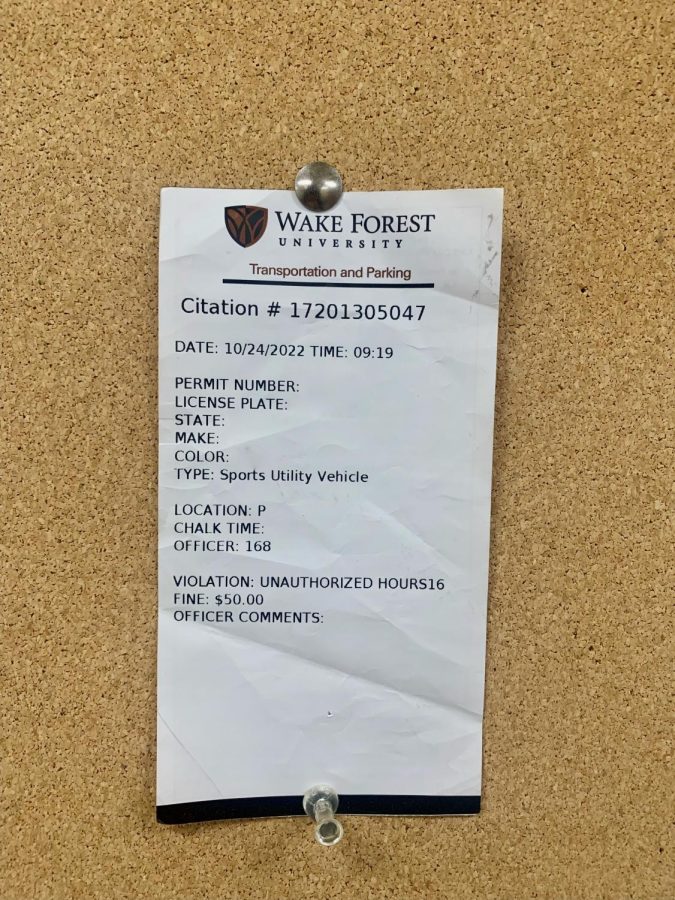Darn the parking police
Parking tickets create equity issues on campus
A parking ticket indicates that a student has been fined $50. The student’s vehicle information has been removed from this image for confidentiality.
November 17, 2022
There are few institutions at Wake Forest as infamous as the parking police. In an unofficial poll of students with cars on campus, it seemed like everyone could relate to the stages of grief resulting from seeing the subject line “Wake Forest University Parking Citation” in their inbox.*
However, what is a mere annoyance for many students is a heavy financial burden for others.
The current ticketing policy does not take students’ differing financial statuses into account, a failing of equity on the school’s part. Wake Forest’s commitment to “make it financially possible for students who are committed to philanthropy, service, friendliness, honor and living Pro Humanitate to enroll at Wake Forest,” as stated on the Student Financial Aid homepage of the university website, should not end with financial aid.
I do not mean to argue that there should be no penalty for parking in prohibited areas — among other things, faculty and staff should have access to priority parking, and it is not acceptable for able-bodied students to park in handicapped spaces — but any given punishment should be proportional and appropriate to the recipient.
To find out more about campus parking issues and parking violations, I reached out to Jason Campbell, the Assistant Director of Transportation and Parking Services; he did not reply to repeated requests for an interview.
Generalizing from what I’ve heard, most parking tickets seem to be given on grounds of “[parking] on campus during unauthorized hours” or “[parking] in an unauthorized zone, location or parking lot,” per the “Violations, Immobilization & Fines” page on the Wake Forest Transportation and Parking Services site. These fines are tiered: $50 for the first offense, $75 for the second and third and $100 for any subsequent violations.
Wake Forest’s student body is disproportionately wealthy compared to other elite academic institutions. A 2017 study published in “The New York Times” found that the median family income of the Wake Forest class of 2013 adjusted for 2015 wages was $221,500, ranking our school at the ninth highest median income among 65 elite colleges — above every Ivy League, Duke, Vanderbilt and many other “rich” schools.
While these figures suggest that most students can afford parking tickets without issue, that does not reflect every student’s situation: the Student Financial Aid’s webpage states that 40% of Wake Forest students qualify for financial aid. It is not hard to imagine the challenges of being a lower-income student at a rich school. Instances where Wake Forest does not seem to consider every student’s financial situation abound: while the Wake Line can take students to Hanes Mall, Target and Sherwood Plaza, no routes go to budget grocery stores such as Aldi. On campus, the Provisions on Demand (P.O.D.) Market prices are generally not wallet-friendly. Crying-after-an-exam essentials such as a pint of Ben and Jerry’s cost two dollars above even the Target price.
Notably, that seven dollars for a pint of P.O.D. Ben and Jerry’s could be above the take-home hourly pay for students on federal work-study programs, illustrating the difficulty working students might have in paying off fines.
“Federal work-study and non federal work study positions on campus have a minimum starting wage of $7.25, but student employees’ starting wage can vary based on the responsibilities of the position,” said Lauren Trethaway, the Assistant Director of Student Financial Aid.
Without taking potential taxes into account, a student earning $7.25 an hour would have to work just under seven hours to pay off one $50 unauthorized parking ticket. With students’ on-campus jobs capped at 20 hours per week, nearly forty percent of a student’s weekly wages could go to paying off a single first-offense ticket.
Monetary fines — while equal — are not equitable. Fifty dollars, let alone $75 or $100, is not the same punishment for everyone. Wake broadly states that a key component of the school’s mission is to create an equitable community; this should apply not only to considerations for people of different sexualities, races, ethnicities or abilities, but to people’s financial circumstances as well. When all students are treated as if they can afford the same tickets, the system becomes biased against lower-income students — which violates Wake Forest’s Financial Aid mission statement and seems at odds with our school’s Pro Humanitate motto.
Further, I take issue with how tickets are currently being distributed. While students can request “no ticket” for a vehicle that cannot be moved because of mechanical issues, there is no such process in place for students affected by illness or injury.
Perhaps most pressingly, many students — especially those who are not male identifying — currently feel unsafe moving their car on and off-campus. While the Wake Line provides shuttles to and from the freshman lot, they only come twice hourly, and, as with any human-operated system, sometimes are unpredictable. If a student were harmed while waiting for a shuttle after being forced to move their car on-campus for the weekend, Wake Forest’s administration would face tough questions.
As long as there is a known harasser targeting Wake Forest students, administration should consider halting requiring students to move their vehicles instead of making students choose between their safety and a fine they may not be able to afford.
Beyond the current situation, however, there are several avenues Wake Forest could consider taking the pressure of parking tickets off of lower-income students.
One, administration might experiment with a ticket system that takes a student’s expected family contribution (EFC) towards school tuition into account. Several European countries such as Finland, Germany and France use similar systems and give what are called “day-fines.” These fines have a minimum amount, and any fee above that is assigned on a sliding income scale. For example, Finland’s ticketing system is individualized to a specific person’s daily disposable income — defined as half an offender’s daily salary — which is then multiplied by a predetermined number depending on the severity of the crime.
While implementing this level of specificity to Wake Forest parking tickets would create an administrative headache, that doesn’t mean in-between steps don’t exist. One potential course of action might be dividing students into categories depending on EFC with each category receiving its own predetermined fines. Transportation and Parking Services would not even necessarily lose revenue depending on how fines were adjusted.
While not creating perfect equity, it would mark progress from the current situation.
Another possible solution could be offering students receiving a certain amount of financial aid the option to perform community service proportionate to the fine.
On GivePulse —Wake Forest’s platform to track community service hours — the popular on-campus service learning opportunity Campus Kitchen lists that Wake Forest students have volunteered 2,632 hours. These hours are valued at a total economic impact of $73,686 — equaling $28 per hour volunteered. If Wake Forest truly values community service at this rate, then students could work off a $50 fine in just under two hours, a far cry from just under seven. However, even if this exact conversion rate is not maintained, proposing community service as an alternative to paying a university fine would still illustrate the school’s commitment to our Pro Humanitate motto while allowing lower-income students to keep the money they may need for necessities.
Yes, it is true that these proposed solutions to make the ticketing system more equitable require some level of administrative effort. However, surely living up to Pro Humanitate means acknowledging that achieving greater justice takes more effort than upholding the status quo.
In the interest of journalistic integrity, I confess that I’ve received two parking tickets to date, both after forgetting to move my car after a weekend of mandatory relocation.















